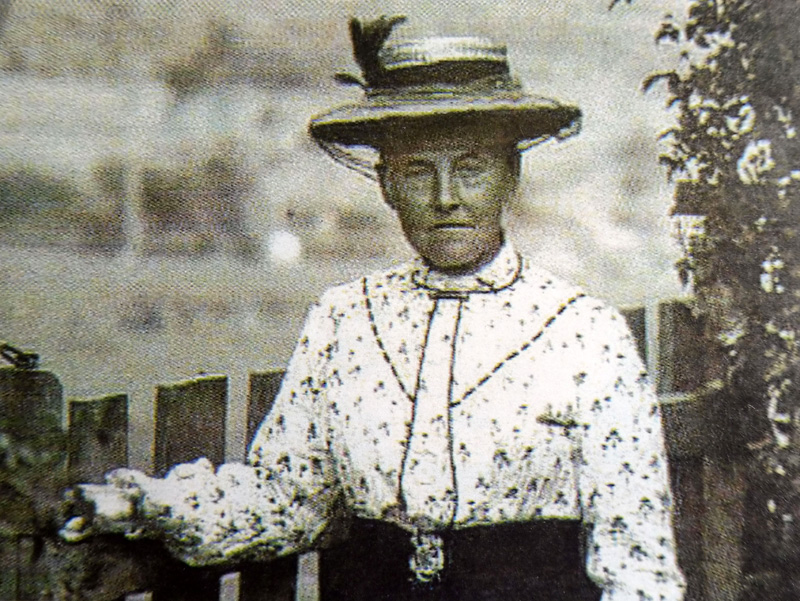
Edith Marcroft was born Frances Edith Drury in Leeds in 1843. Her parents Judith Holmes and Samuel Drury had married at St Peters, Leeds, Yorkshire on 8 September 1836.
Her own marriage took place on 1 May 1862, also at St. Peters. She was only 19 years and immediately left for New Zealand with her husband Edwin Marcroft on board the Matilda Wattenbach. Along with a large extended family of Marcrofts they had signed up for Brame's Albertland Settlement Scheme.
Shipboard life was particularly tough for Edith as she overcame her seasickness and endured the discomforts of shipboard life. Oral history suggests that she even begged the captain to allow her transfer to a passing ship returning to England. Captain Goudie reportedly responded “Mrs Marcroft I wouldn’t put you on board that ship for the world – you see that yellow flag – well that means they have fever on board”. Her disappointment probably turned to despair when, after rounding the Cape of Good Hope, their ship was dismasted and considerable damage occurred.
On arrival in Auckland they discovered things remained very primitive and even getting to their 'promised land' required walking overland via muddy tracks and bush and hiring a cutter to get them to the southern most portion of the Albertland settlement. Edith was the first carried ashore by Mr. Bonner, a fellow traveler. Although he remarked how honoured she should feel being the first white woman to set foot on the shore she replied “I’d feel a great deal more honoured if you were setting me down in England. Instead she was deposited on a rough beach bordered by mangroves, fern and flax bushes. Further distant were the bush clad hills with dense undergrowth.
The couple initially camped under the stars on the water's edge of a sheltered bay but Edwin soon had a nikau whare constructed with slab walls and palm fronds forming the roof, at Te Wheau. It was about three years before their proper weatherboard cottage at Wharehine was erected about a mile yonder on another part of their farm. This was two storied and made of pit-sawn kauri, puriri foundation blocks and floors of totara. There was a kitchen-dining room with pantry attached, drawing room, and two bedrooms downstairs. The children’s bedrooms were upstairs. Most of the furniture was hand-made.
William Thomas Henry Marcroft (27 August 1864-1940), their first child, was the first white child to be born in the settlement and stirred the curiosity of the local Māori. Although they occasionally visited there was never any animosity between Māori and settlers.
Henry DRURY (1871-1920), Edwin Holmes (1875-1956) and Fredrick Charles (1879-1939) completed the family.
As Edith’s family grew and then grandchildren followed her evangelical spirit never waivered. Described as “catechizing” she would insist that being good and doing good works were not sufficient. Becoming a Christian involved repentance, acceptance of Jesus Christ as Saviour, a call to spiritual holiness and the practice of Christian fellowship.
Initially the Marcroft whare regularly served as their church with community sing-a-longs involving Edith as organist. Her harmonium had come with her from England and been part of the bullock load that brought their precious belongings overland to their new home. After the opening of the little Wharehine chapel (which Edwin helped build) she played most Sundays, a commitment she maintained until well into her eighties. On one occasion the Wesleyan missionary Rev Gittos joined them and exclaimed ‘Never did I expect to hear anything so lovely in this wild country’. Rising at five every morning she played her organ daily. For over sixty years she served the Lord through her music. It was also commonplace to seat 21 people around their huge dining table after church on Sunday for a meal, although all the preparation would have been shared with preparation accomplished the previous day.
Edith’s additional responsibility was that of communion steward while Edwin was a trustee or elder of the Wharehine Minniesdale Church. They were also instrumental in the establishment of the Band of Hope and supported the temperance cause as it swept the nation.
Despite a number of household and farming chores, she still had time to teach music and organise her pupils to sing in the various soirees that were held locally. Their sons were taught music and Edwin and Fred were given the finest violins money could buy, at the time. William played the organ and later became a lay preacher in the district.
Another love was her garden. Here she planted English flowers to remind her of 'home' in Yorkshire, where her own mother and sisters remained. Edith was renowned for having a well-run and spotless household. Friday was generally baking day. Fruit and vegetables were gathered from their garden and orchard and served in pies and cakes. Once made, they were stored on shelves in the dairy. Cream was hand-skimmed from the pans of milk. A little under five feet in height, Edith was a woman of abundant energy. Her red hair was parted in the middle and pulled back into a bun. Combined with her long dark dresses, white crisp aprons and strictness she seemed more Quaker-like in appearance than Wesleyan, which was her heritage.
Her husband Edwin had died on 5 Nov 1909. Despite being widowed she stayed on in rural Wharehine and died 7 Sep 1937 aged 94 years. Edith is buried in the historic Minniesdale Church yard.
Biography contributed by Margaret Jenkin
Sources
- PapersPast newspaper references
- NZ BMD Indexes
- Albertlander by J.L. Borrows 1969
- The Albertlanders Brave Pioneers of the Sixties, Sir Henry Brett and Henry Hook, 1927
- Albertland District Museum resources
Image

Edith Marcroft (Marsh Collection)
Click on sheet number to see the 1893 petition sheet this signature appeared on. Digital copies of the sheets supplied by Archives New Zealand.

Community contributions